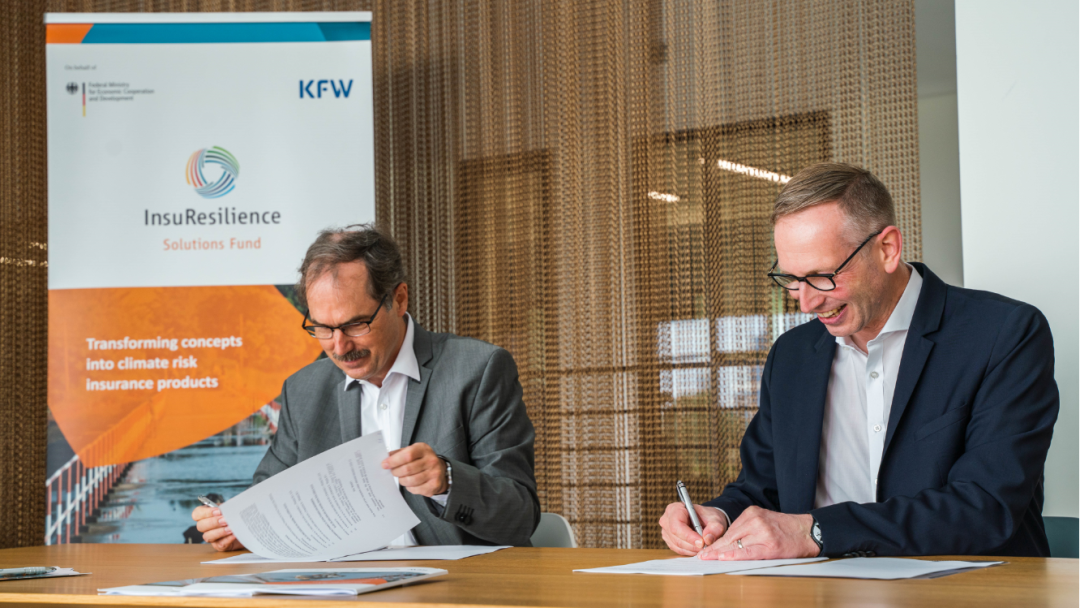News from 2021-07-14 / KfW Development Bank
Commitment to climate insurance expanded - New phase for InsuResilience Solutions Fund

The InsuResilience Solutions Fund (ISF) supports innovative climate risk insurance products for developing and emerging countries to mitigate the impacts of climate change. KfW established the ISF on behalf of BMZ in 2019; the Frankfurt School of Finance and Management implements the program, which is now entering a new phase.
On July 9, KfW and Frankfurt School formally sealed the continuation of their cooperation on the ISF. At the same time, KfW increased its support for the ISF by an additional EUR 45 million in BMZ grant funds. This is in response to the strong demand for insurance products in poorer countries.
The ISF aims to promote the supply of innovative and sustainable approaches to climate risk insurance in developing and emerging countries. These products aim to strengthen the resilience of households, small and medium-sized enterprises, and governments to the impacts of climate change and natural disasters. To this end, ISF provides support at three levels: It conducts comprehensive climate risk analyses that provide an important basis for decision-making on climate adaptation and risk management measures. It finances the development of new concepts and products for insurance solutions against climate risks, which are intended to cover poor population groups in particular. And it supports the market launch of such products.
Several hundred applications received
Since its founding, the ISF has already launched five product competitions, which have attracted worldwide interest. Applicants have included companies and organizations from the private and public sectors, as well as civil society. To date, the fund has received over 200 applications for co-financing.
The ISF is also a key part of the InsuResilience Global Partnership, which stems from the 2015 G7 Summit in Germany. This global partnership has set out to hedge climate and disaster risks through appropriate financing and insurance solutions. By 2025, it aims to help protect an additional 500 million people against extreme weather events in this way.
Even more important because of Corona
In light of COVID19, insurance solutions are more important than ever to cushion additional burdens from natural disasters. The global partnership therefore wants to work with 80 countries each to develop comprehensive disaster risk financing and insurance strategies and integrate them more closely into national policies. The new phase of the ISF is now also intended to contribute to this.
Insurance is seen as a good and recognized means of better managing increasing climate risks, especially for poorer countries. UN Secretary-General António Guterres therefore recently called again for such solutions to be expanded and for development financing to be linked more systematically with climate risk financing and insurance. With the additional funds, the ISF can make a contribution precisely in this sense.
High development policy relevance
Frankfurt School President Professor Dr. Nils Stieglitz attests to climate finance and insurance's "high developmental relevance" as a means of climate change adaptation and disaster risk reduction. "The InsuResilience Solutions Fund," he said at the signing, "is doing important implementation work in this area, combining both private and public sector interests."
Dr. Frank Weiler of KfW also reiterated the benefits of insurance solutions, saying, "The consequences of climate change are becoming increasingly evident. That's why innovative solutions to mitigate them, such as those being developed by the ISF, are particularly important for poor countries."

Share page
To share the content of this page with your network, click on one of the icons below.
Note on data protection: When you share content, your personal data is transferred to the selected network.
Data protection
Alternatively, you can also copy the short link: https://www.kfw-entwicklungsbank.de/s/enzBWrMC.Ch7A
Copy link Link copied